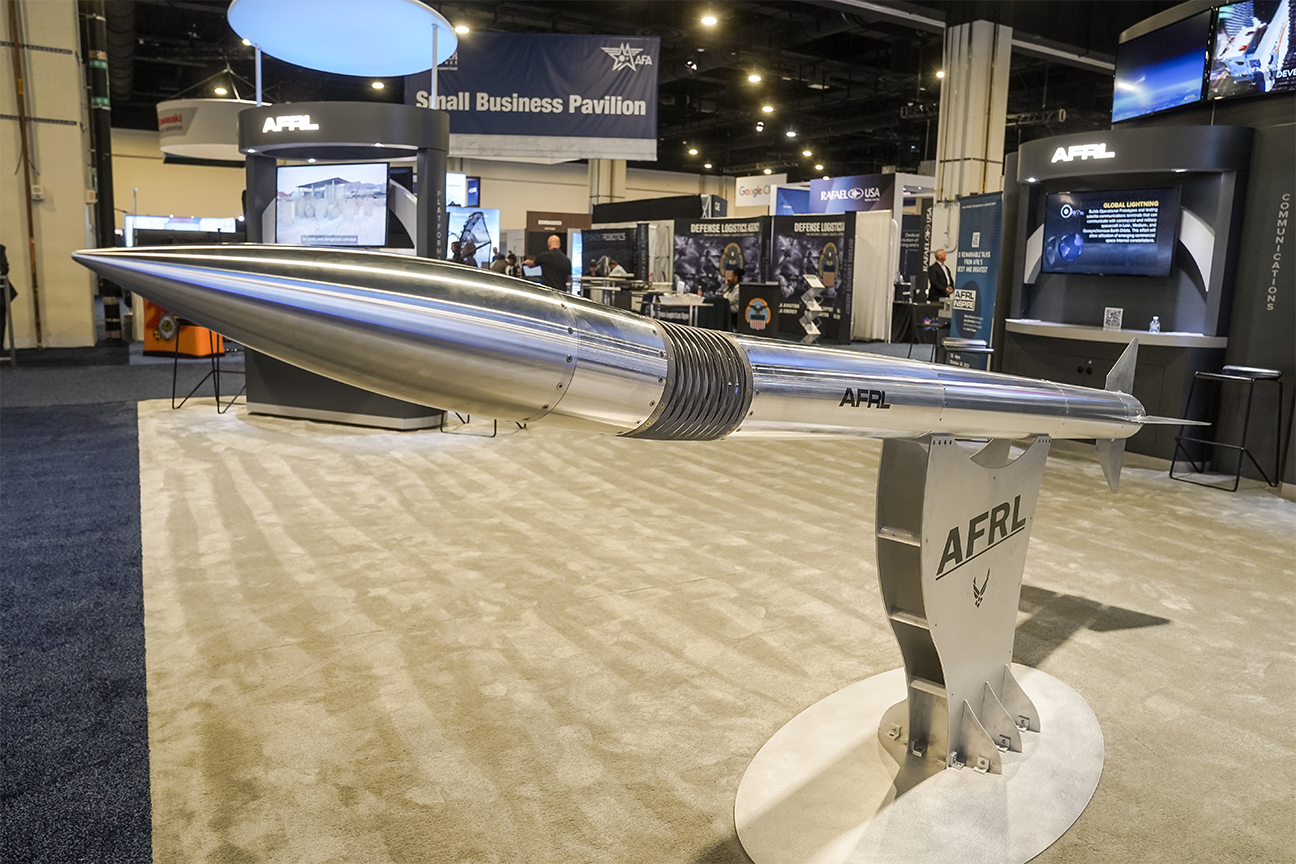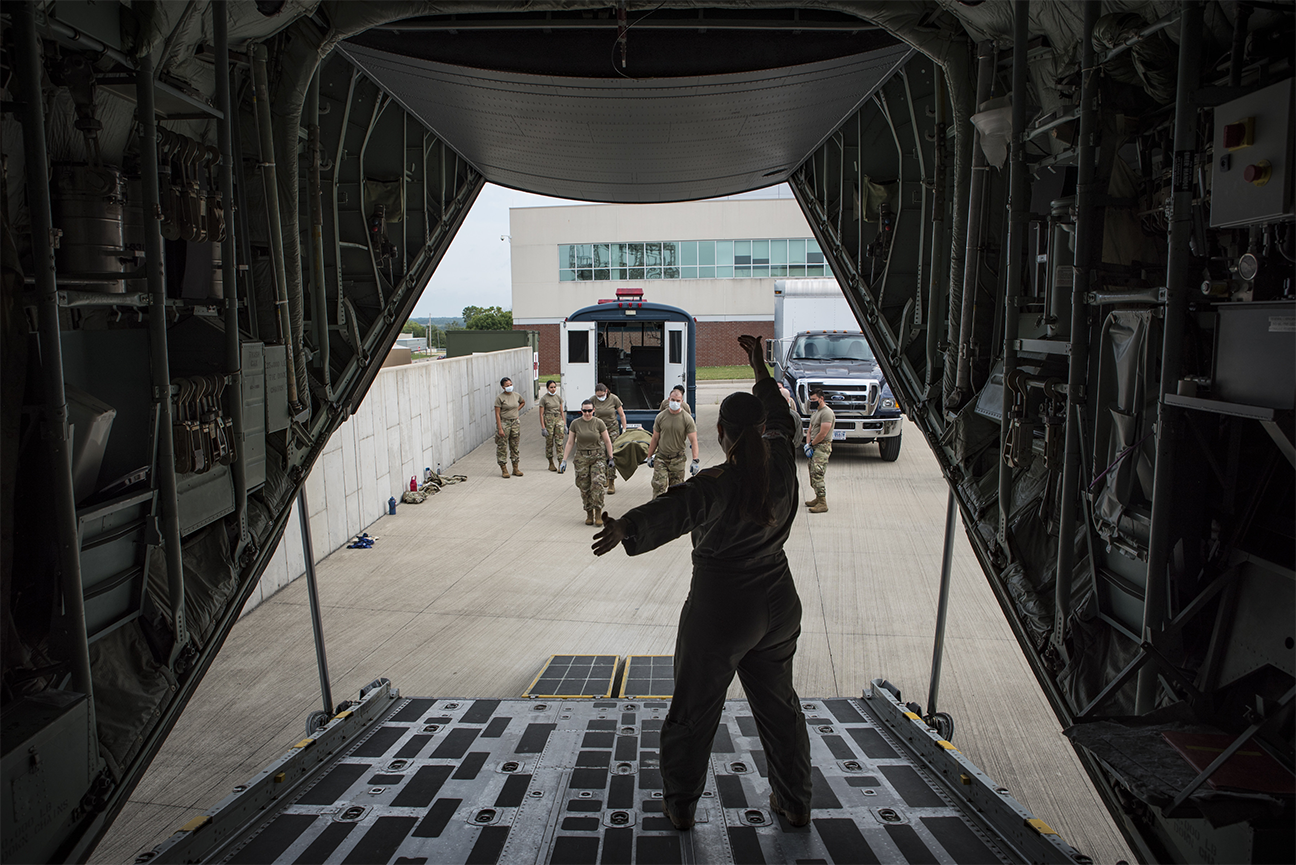AFRL to highlight lab’s efforts to ‘Drive the Future Fight’ at AFA Warfare Symposium
WRIGHT-PATTERSON AIR FORCE BASE, Ohio (AFRL) – The Air Force Research Laboratory, or AFRL, will showcase nine technologies during the Air and Space Forces Association’s Warfare Symposium Feb. 12-14, 2024, at the Gaylord Rockies Resort and Convention Center in Aurora, Colorado.
This year’s AFA conference theme is “Preparing for Great Power Conflict”, and attendees can expect to see AFRL displays highlighting multiple programs and technologies with a special focus on science and technology, or S&T. The AFRL exhibit booth theme is “Drive the Future Fight.”
Maj. Gen. Scott A. Cain, AFRL commander, will participate in a panel discussion titled “The Hypersonics Weapons Fight” Feb. 13, 2024, at 3:35 p.m. in the convention center’s Aurora Ballroom. Additional panelists will include Gen. Glen D. VanHerck, commander, U.S. Northern Command and North American Aerospace Defense Command; retired Navy Vice Adm. Jon A. Hill, former director of the Missile Defense Agency; and Derek Tournear, director of the Space Development Agency within the Office of the Under Secretary of Defense for Research and Engineering. Dr. Mark Lewis, Air Force chief scientist from 2004-2008 and currently CEO of Purdue Applied Research Institute, will moderate discussion.
AFRL programs and technologies on display
AFRL’s booth at the symposium will highlight warfighting technologies and programs that emphasize AFRL’s technological superiority and recent advancements in the lab to support the nation’s defense. These include high mach turbine engines, or HMTE; Rapid Energetics and Advanced Rocket Manufacturing, or RE-ARM; missile utility transformation via articulated nose technology, or MUTANT; Electronic Warfare/Electromagnetic Spectrum Systems, or AERRES; Counter Uncrewed Aircraft Systems, or UAS; Global Lightning; Biocementation; En Route Care Training; and Autonomous Closed Loop Control of Mechanical Ventilation.
HMTE are optimal for supersonic applications and allow the Air Force to unlock additional trade space in terms of speed, range and payload size and type. HMTE is applied to standoff missiles in the near term, and as part of the integrated solution for reusable hypersonic platforms long term.
AFRL’s RE-ARM program is developing inexpensive solid rocket motor, or SRM, production equipment enabling revolutionary, affordable, flexible, scalable capability to produce state-of-the-art SRMs to support national defense needs. This approach enables affordable expansion of the industrial base with both current and emerging partners.
Missile utility transformation via articulated nose technology, or MUTANT, is an AFRL technology that is a form of active morphing involving high-rate pivoting of the missile forebody, referred to as articulation. Articulation is accomplished with an articulation control actuation system, comprised of a composite high-strain skin structure that envelops an internal electromagnetic actuation system.

AFRL’s MUTANT display at the Air and Space Force Association’s Air, Space & Cyber Conference at National Harbor, Maryland, Sept. 11-13, 2023, highlights the research effort to significantly increase missile range and lethality against highly maneuverable targets with a better flight control system. The MUTANT program’s approach is a form of active morphing involving high-rate pivoting of the missile forebody, referred to as articulation. This area of research has developed over the last 15-20 years with basic research support from the Air Force Office of Scientific Research, or AFOSR, and will continue with research conducted at the newly launched AEROMORPH Center of Excellence at the Florida Center for Advanced Aero-Propulsion, or FCAAP, located in Tallahassee, Florida. (U.S. Air Force photo / Cherie Cullen)
The Strategic Development Planning and Experimentation, or SDPE, AERRES experimentation campaign assesses open architectures for rapid deployment or upgrade of electronic warfare, or EW, software in platform agnostic ways. Through numerous successful flight tests of the capability in partnership with the operational and acquisition communities, AFRL has demonstrated the utility of an open architecture approach to EW. AERRES also illustrates AFRL’s ability to take strategic demand signals and use them to influence design methods that deliver relevant capabilities rapidly to drive change with speed and dominate the electromagnetic spectrum.
Counter UAS is developing and rapidly prototyping systems to detect, identify and defeat adversary UAS in different areas of the world. Automation and machine learning technologies are employed throughout the system to provide this capability.
Global Lightning is a prototyping and experimentation campaign to provide reliable, secure satellite communications to both stationary and mobile users. The focus of the Global Lightning program has now advanced to the creation of multi-constellation systems capable of communicating with five to 10 commercial and military satellite communications systems in low-, medium-, and geostationary orbits (LEO, MEO, and GEO) across multiple frequency bands, referred to as Hybrid SATCOM.
Biocementation uses processes to rapidly expand austere airfields using common agricultural chemicals and natural resources, such as soil and water found at the location. These processes significantly reduce the need for heavy equipment, large teams of civil engineers or large quantities of cement and other materials to be shipped to the site.
En Route Care Training educates and trains total force medical personnel responsible for delivering basic and advanced en route care capabilities within the aeromedical evacuation system using the most advanced modalities and realistic mission environments possible. It also provides potent training venues to fulfill clinical currency and readiness skills requirements.

Capt. Alicia Houston, flight nurse instructor in the U.S. Air Force School of Aerospace Medicine, directs a team of medics from the ramp of a C-130 as they unload a patient manikin from an AMBUS during deployment training Aug. 12, 2021. En Route Care Training educates and trains total force medical personnel responsible for delivering basic and advanced en route care capabilities within the aeromedical evacuation system. En Route Care Training uses the most advanced modalities and realistic mission environments possible, and provides potent training venues to fulfill clinical currency and readiness skills requirements. (U.S. Air Force photo / Richard Eldridge)
Autonomous Closed Loop Control of Mechanical Ventilation supplies a unique capability for managing respiratory care patients. It automatically keeps hemoglobin oxygen saturation within a clinician’s target range while reducing oxygen supply requirements without the clinician monitoring its function. This safe alternative provides continuous monitoring and adjustment as ambient pressure or patient conditions change, making it especially relevant for situations like critical care air transport medical missions.
Symposium attendees can access additional information about potential partnership avenues with AFRL by visiting the AFRL exhibit booth. AFRL possesses a rich history of participation in joint science and technology ventures and is actively seeking future collaborations.
For more information about AFRL’s programs and technologies, visit https://www.afresearchlab.com.
To register for the symposium, visit https://2024aws.expotracker.net/index.aspx.
For more information about the AFA Warfare Symposium, visit https://www.afa.org/afa-warfare-symposium/.
For more information about AFRL’s presence at the conference, visit https://afresearchlab.com/events/afa-warfare-symposium-2024/.
NOTE FOR MEDIA: Please contact Aleah Castrejon, AFRL media operations, at 815-579-2678 or email afrl.pa.inquiry@us.af.mil to request an interview opportunity to discuss these technology exhibits and learn more about these efforts.
About AFRL
The Air Force Research Laboratory (AFRL) is the primary scientific research and development center for the Department of the Air Force. AFRL plays an integral role in leading the discovery, development and integration of affordable warfighting technologies for our air, space and cyberspace force. With a workforce of more than 12,500 across nine technology areas and 40 other operations across the globe, AFRL provides a diverse portfolio of science and technology ranging from fundamental to advanced research and technology development. For more information, visit www.afresearchlab.com.
